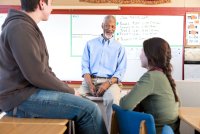The Importance of Purpose in Education
Students can discover a sense of purpose in their learning through questions that lead them to think about their interests.
Your content has been saved!
Go to My Saved Content.I recently met with an eighth-grade student who had been accepted to a specialized high school focused on science. I wanted to compliment her on her achievement and learn more about the academic experiences that led to her choice of high school. I already knew her to be a young lady who was determined, hardworking, and intelligent—but I didn’t know what made her tick.
During our discussion, I asked about her experiences in our school. She shared her arc of learning as a student, and gushed about the joy she had as a member of both our after-school band program and our extracurricular drama program.
I asked what had made her choose the high school she had, given that she had strengths in a variety of other areas. She smiled and said, “I’m really fascinated by science and medicine—it makes me curious.”
She planned to continue her pursuits in the arts, but she was clear that her love for science was going to drive her efforts.
I left the conversation inspired as an educational leader. Certainly we have to fulfill mandates and meet educational standards, but so often our students leave our schools uncertain about who they are in the world and without a fully formed sense of purpose. Academics without purpose can be an exercise void of substance.
We can powerfully influence the level of learner actualization in our classrooms if we ask the right questions to help students develop that sense of purpose.
Facilitating Self-Reflection
Asking the right questions develops a deeper understanding of self. How many professionals do you know who would have chosen an alternate career path if they had asked different questions at the start? The same can be said for students in the classroom.
Take a learner who is reluctantly engaged in a project. Maybe they enter into the work with a series of starts and stops, or they ask the teacher for a topic change several times before getting into the meat of the work, only to come up with nothing in the end. What if the student was given an opportunity to reflect on what they’re worried about in an effort to understand what stops them from fully following through?
I’ve seen many students decide early on in their learning life that they were good at one subject and bad at another. These beliefs are often difficult to dismiss. Asking students to identify topics they’re interested in but haven’t tried offers amazing benefits. A deeper dive into this line of questioning may result in an understanding of what stops them in their exploration.
Students need to develop a consistent, self-regulated feedback loop. Effective questions can facilitate this. What is your proudest achievement? What is your biggest failure? What would you do if you knew that failure was not an option? These are the types of questions students need to consider on a regular basis.
The Influence on the Work
The impact on work products in and out of the classroom can be substantial if robust reflective questions are leveraged properly and educators more fully understand students’ interests. Learners can begin to take ownership of their goals and develop authentic growth points.
A standards-driven education can be both highly productive and personally rewarding. There’s no reason to think that these things cannot exist in the same space—but in order for this to happen effectively, students must develop their own path to outcomes of their choosing.
Much the same as a hiker entering the woods, when students begin a project or unit of learning there should be trail markers along the way. In education we’re very good at devising benchmark assessments to collect formative data, but what of the innate and essential learners who are before us?
Teachers should mindfully craft authentic learning reflections along the way for their students. The form need not matter. Pen and paper suffice, as does a rubric, or a Google form. I’ve seen teachers seamlessly incorporate these reflections into student conferences. The point is for students to have a process and a space to consider their life as learners.
Helping Students Find Their Truth
In Hamlet, Polonius famously advises his son, Laertes, “To thine own self be true / And it must follow, as the night the day, / Thou canst not then be false to any man.” But what if our students do not know themselves?
Learners who are authentically true to themselves will explore with abandon. The insights gained from reflective questions can be used by students and teachers to develop links between various subjects and spark interests in multiple curricular areas.
As students tend the garden of self-discovery, new curiosities will naturally arise. The transfer of key understandings and the information that applies to multiple concepts can provide inspiration and clarity to the confused and disaffected learner. For those who are already on a path to their most authentic self, these questions will support a deeper and more rewarding journey.
